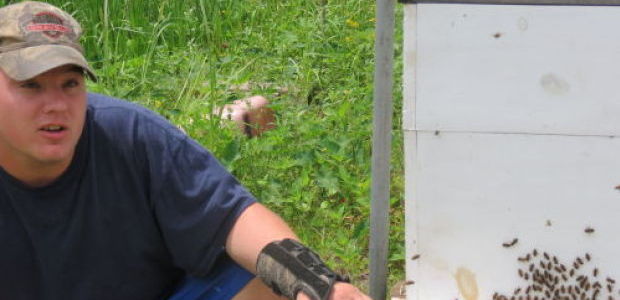HLB, other locals, struggling to battle River Parish foes
April 15, 2014
Laf. councilman hospitalized
April 15, 2014A little over a year ago, Cameron Loupe spent a lot of time catching catfish and turtles as a commercial endeavor.
But familiarity with nature and a willingness to try just about anything brought him to obtain a state license for wildlife pest removal.
While doing that work, the 25-year-old Bayou Boeuf native turned his attention to bees.
“I was in a cane field and came across a metal drum full of bees,” Cameron explained. “I took them home and started learning all I could.”
The result is a very busy new endeavor, which involves capturing nuisance bees and bringing them to his home, where they produce honey in a series of white-panted bee boxes.
The honey retails for about $5 per jar.
But with spring in full bloom, Cameron has a mission that goes beyond honey profits.
“Too many people are killing bees,” he said. “And that’s not good because bees pollinate everything.”
Although he charges to remove bees from inside the walls for houses – at a rate that he says is a lot lower than many other removal people charge – there is no charge for attracting and removing a swarm from the exterior of a house, or a tree on someone’s property.
Too often, Cameron said, people will kill bees out of fear.
“They should just call me,” he said, pointing to the cell number on the side of his pickup, 985-413-2088.
From the day he brought home the drum bees, Cameron has read everything he can about the critters, and was surprised at how much he didn’t know. What fear he may have had of the bees was replaced by knowledge, something he wishes would be the case with all who come in contact with him.
Behind the house he shares with his father and mother, Cameron sat placidly beside one of his hives, pointing out the marvels of bee culture, such as how queen bees end up becoming queens for hives that don’t have them, and the different specialized jobs that worker bees have.
When doing the actual work of a beekeeper, he wears a protective suit. But just chilling with his swarms, he said, requires no gear.
“Just don’t wave your arms around at them,” he cautioned.
He has responded to bee calls throughout Lafourche and Terrebonne, although he prefers the higher latitudes of Gray, Thibodaux and Raceland.
“When you get down near the saltier water the bees are meaner,” he said. “They are more aggressive for some reason.”
Cameron’s concern for the bees is well placed, if some of the stories floating around are true.
The Washington, D.C., based National Resources Defense Council notes on a special page dedicated to bees that they are a vanishing species, and that their disappearance in many parts of the country is threatening huge agriculture operations to the tune of $15 billion.
Beekeepers first sounded the alarm about disappearing bees in 2006, the Defense Council’s bee page states.
“Seemingly healthy bees were simply abandoning their hives en masse, never to return,” the Council’s bee fact sheet states.
Researchers call that Colony Collapse Disorder, and they estimate that “nearly one-third of all honey bee colonies in the country have vanished.”
Pesticide exposure, parasites and shrinking food supplies are among the theories posited by scientists. A virus that targets bee immune systems is also blamed.
“People here can save them right now,” Cameron said, happy for the egg money the honey jars fetch but expressing greater concern for the honey makers themselves.
“It gives me something to do is what it came down to,” Cameron said. “It’s a good hobby. I’d rather rescue the bees than kill them. And that’s what we are trying to do is stop people from killing them.”
Cameron Loupe examines one of his bee-boxes, which he is using to produce honey for local sale in the north Lafourche hamlet of Kraemer. Cameron is hoping homeowners will get in the habit of calling beekeepers like himself to remove bees so that they can be productive rather than be destroyed.











